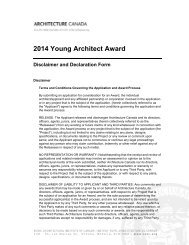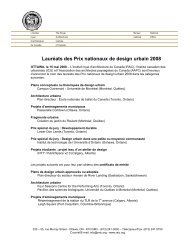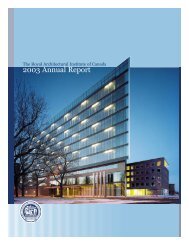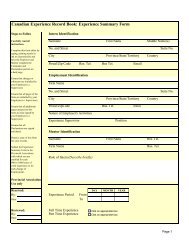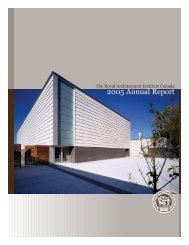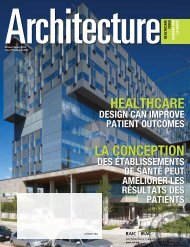Benchmark Study on Green Buildings - Royal Architectural Institute ...
Benchmark Study on Green Buildings - Royal Architectural Institute ...
Benchmark Study on Green Buildings - Royal Architectural Institute ...
Create successful ePaper yourself
Turn your PDF publications into a flip-book with our unique Google optimized e-Paper software.
the purchase and installati<strong>on</strong> of a qualifying system, up to a maximum refund of $80,000.<br />
REDI also offers architects and designers an incentive of up to $10,000 to offset the cost<br />
of the incremental design time associated with the inclusi<strong>on</strong> of renewable energy<br />
technologies in building designs.<br />
Technology Early Acti<strong>on</strong> Measures (TEAM) Project:<br />
The Technology Early Acti<strong>on</strong> Measures (TEAM) Project is an interdepartmental<br />
technology investment program offered by the Government of Canada. TEAM supports<br />
projects that are designed to dem<strong>on</strong>strate technologies that mitigate greenhouse gas<br />
(GHG) emissi<strong>on</strong>s nati<strong>on</strong>ally and internati<strong>on</strong>ally, and that sustain ec<strong>on</strong>omic and social<br />
development. The TEAM program follows a unique approach that is built <strong>on</strong> incremental<br />
financing and extensive networking, and brings together industry, community, and<br />
internati<strong>on</strong>al partners to encourage additi<strong>on</strong>al investment. TEAM operates under the<br />
leadership of Natural Resources Canada, Envir<strong>on</strong>ment Canada, and Industry Canada, and<br />
TEAM project partners include large and small companies in Canada and around the<br />
world, provincial and municipal agencies, and foreign governmental organizati<strong>on</strong>s. As of<br />
March 2004, TEAM has supported 98 projects in 64 Canadian cities (representing 10<br />
provinces and 2 territories). Internati<strong>on</strong>ally, TEAM-supported projects can be found in 13<br />
other countries: Argentina, Brazil, Chile, China, Costa Rica, Cuba, Egypt, India, Pakistan,<br />
Panama, Poland, Romania, and Russia. TEAM investments are aligned with the federal<br />
government's Climate Change Technology and Innovati<strong>on</strong> initiative. As a result, TEAM<br />
provides project support in five major priority areas: cleaner fossil fuels, energyefficiency<br />
technology, biotechnology, hydrogen ec<strong>on</strong>omy, and decentralized energy<br />
producti<strong>on</strong>. To receive TEAM support, a project must result in, or lead directly to GHG<br />
reducti<strong>on</strong>s, removals, or both. This initiative supports the green building movement by<br />
encouraging the development of new energy and resource-c<strong>on</strong>serving technologies.<br />
Industrial Research Assistance Program (IRAP):<br />
For Canada’s small and medium-sized enterprises (SMEs, defined for the purposes of this<br />
program as businesses with fewer than 500 employees), the Nati<strong>on</strong>al Research Council<br />
(NRC) runs the Industrial Research Assistance Program (IRAP), which provides a range<br />
of both technical and business oriented advisory services al<strong>on</strong>g with potential financial<br />
support. IRAP’s services are fourfold: technology expertise and advisory services,<br />
financial assistance for R&D activities, networking opportunities, and partnerships. Like<br />
the TEAM program but <strong>on</strong> a smaller scale, IRAP supports Canada’s SMEs in c<strong>on</strong>ducting<br />
R&D projects.<br />
Sustainable Development Technology Canada (SDTC):<br />
Sustainable Development Technology Canada (SDTC) is a not-for-profit foundati<strong>on</strong> that<br />
finances and supports the development and dem<strong>on</strong>strati<strong>on</strong> of clean technologies which<br />
provide soluti<strong>on</strong>s to issues of climate change, clean air, water quality and soil, and which<br />
deliver ec<strong>on</strong>omic, envir<strong>on</strong>mental and health benefits to Canadians. Established by the<br />
Government of Canada in 2001 and beginning operati<strong>on</strong>s in November of the same year,<br />
SDTC’s missi<strong>on</strong> is to act as the primary catalyst in building a sustainable development<br />
technology infrastructure in Canada. However, SDTC does much more than fund<br />
research leading to groundbreaking technologies. It works closely with an ever-growing<br />
61



